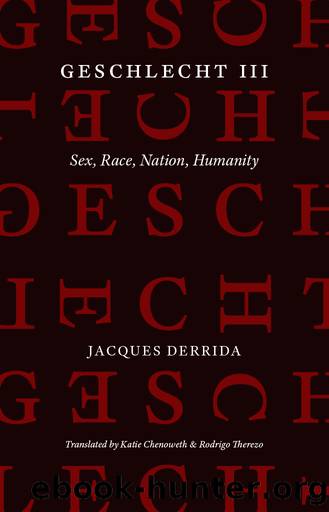Geschlecht III: Sex, Race, Nation, Humanity by Jacques Derrida

Author:Jacques Derrida [Derrida, Jacques]
Language: eng
Format: epub
Tags: Social Science, General, philosophy, Movements, PHI000000 Philosophy / General, Existentialism, Deconstruction, Gender Studies
ISBN: 9780226677460
Google: Qcf4DwAAQBAJ
Publisher: University of Chicago Press
Published: 2020-10-02T00:27:21.208551+00:00
The rest of the demonstrationâthe rest of the paragraph in which Heidegger claims to dismiss, as it were, those who want to make Trakl a Christian poet and thus his thinking of Geschlecht a Christian thinking or poetryâis also, in my opinion, âinsufficient,â to use Heideggerâs word when he qualifies the concepts of dogmatic or metaphysical theology (nicht zureichen). What, indeed, does Heidegger say? He says it again in the form of a false question: why doesnât Trakl say that if he is Christian? Why, instead of that, does he say this other thing which, it is implied, is not Christian. Why, for example, instead of naming God and Christ does he âname the wavering shadow of the sister (den schwankenden Schatten der Schwester), and the latter as âthe greeterâ [as the French translation says for als die grüÃende, âshe who greets,â252 says the poem]?â253 Strange. First of all, it is not clear why this would come instead of the name of Christ (statt dessen), and even if it does come in its stead, is it such an un-Christian metonymy that would replace the name of Christ, son of God, and the name of God, father of Christ, with the name of the sister? If you gave me a little time, I would undertake what would not be just an exercise, what is on the contrary a very serious thing that could be experienced with fear and trembling, but which might today become a mere exercise, which would consist in demonstrating that the figure of the sister and that of Christ can very easily be substituted for one another. And precisely in Traklâs corpus, if I may say so. How is one to determine the sex of Christ, and how is one to characterize, within sexual difference, the properly Christian, decidedly Christian experience that a man (supposing that Trakl is a man, decidedly a man, âone-sidedly a man,â as one of Joyceâs commentators dared to say of him) or a woman has of the relation to Christ? The son of God, Christ is brother to all men and women, at the same time as he is the image or intercessor of the father. But a brother whose virility is never simply manifest or unilateral, a brother who presents himself in an aura of universal homosexuality, or in a peaceful, pacified (gentle, Trakl would say) sexual difference, outside the moment of temptation where evil is near, a brother, then, who is perhaps no different than a sister. And the sexual determination of a son born of a virgin, herself born of an immaculate conception, cannot be sure enough that one can blithely say: where the poet names the sister instead of Christ he does not name Christ, he is not Christian, or whatâs more, his poem is not Christian. This is all the more impossible or hasty given that Heidegger himself does not fail to call attention to this strange couple of brother and sister in Traklâs poems. I say âcoupleâ
Download
This site does not store any files on its server. We only index and link to content provided by other sites. Please contact the content providers to delete copyright contents if any and email us, we'll remove relevant links or contents immediately.
| Anthropology | Archaeology |
| Philosophy | Politics & Government |
| Social Sciences | Sociology |
| Women's Studies |
Born to Run: by Christopher McDougall(7109)
The Leavers by Lisa Ko(6942)
iGen by Jean M. Twenge(5399)
Sapiens by Yuval Noah Harari(5348)
Spare by Prince Harry The Duke of Sussex(5166)
The Kite Runner by Khaled Hosseini(5158)
Machine Learning at Scale with H2O by Gregory Keys | David Whiting(4283)
Bullshit Jobs by David Graeber(4167)
Never by Ken Follett(3922)
Goodbye Paradise(3791)
Livewired by David Eagleman(3755)
Fairy Tale by Stephen King(3358)
A Dictionary of Sociology by Unknown(3059)
Harry Potter 4 - Harry Potter and The Goblet of Fire by J.K.Rowling(3048)
The Social Psychology of Inequality by Unknown(3010)
The Club by A.L. Brooks(2911)
Will by Will Smith(2891)
0041152001443424520 .pdf by Unknown(2837)
People of the Earth: An Introduction to World Prehistory by Dr. Brian Fagan & Nadia Durrani(2719)
